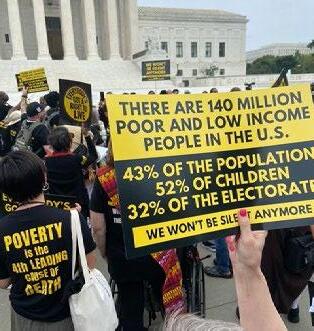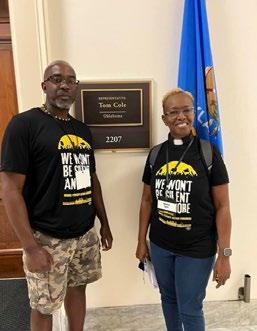
5 minute read
Poverty: An Indictment on the Poor or Humanity?
from The Contact 2-14-24
by okumc
BY REV. VALERIE STEELE
For you always have the poor with you, and you can show kindness to them whenever you wish, but you will not always have me. (Mark 14:7, CEB)
In 1968, Dr. Martin Luther King, Jr. and the Southern Christian Leadership Conference created what was called the Poor People’s Campaign. At the time, the U.S. government, under President Lyndon B. Johnson, had much of their attention focused on the war in Vietnam. Although President Johnson had begun a war on poverty with the goal of eradicating poverty, it did not get much traction in Congress. Unfortunately, the issue of poverty by many of the lawmakers was perceived for the most part as a Black people’s problem. Remember, this was 1968. The gains of the Civil Rights Movement were taking hold with all deliberate speed.

Before the demands of the Poor People’s Campaign were delivered at the Poor People’s March on Washington, Dr. King was assassinated. Without skipping a beat, the Rev. Ralph Abernathy picked up the mantle and continued the effort. The March presented six demands to Congress on behalf of all persons impacted by poverty. These demands included: fair, livable wages; cease all budget cuts from public education; insure livable housing to name a few. Roughly
3,000 people set up an encampment protesting for six-weeks on the Washington Mall. Though Dr. King was not with them, one thing he put in motion was the importance of showing the every day American the actual faces of persons affected by injustice. Congress would have to see the many faces of persons— all skin colors, ages, ability, etc.— suffering due to poverty in the U.S. and so would any one watching or reading the daily news.
While Methodists were uniting in 1968, it was also a presidential election year. The Poor People’s March on Washington was a talking point for those running for president. Presidential candidate Richard Nixon spoke out against Congress yielding to the demands of the Poor People’s Campaign. News outlets cast a negative spin on the Poor People’s Campaign and its efforts. Even with real, impacted persons desperately pleading their cases, the protest would be squashed. Afterwards, some change did occur very slowly in its implementation. Yet, even 55 years later, poverty still exists and has grown.
In 2017, the Rev. Dr. William Barber, III, resurrected the cause for giving voice to those suffering under the interlocking injustices of our day. Now called the Poor

People’s Campaign: A National Call for Moral Revival, this movement has gained momentum in 32 states including Oklahoma.
Did you know that poverty is the fourth leading cause of death in the U.S.? In 2019, before the COVID pandemic, that statistic equated to 183,000 deaths per year, or over 800 deaths a day! In THIS country, poverty should not be a death sentence! In a state where there is an overwhelming abundance of churches claiming to following the way of Jesus Christ, why between 2018-2020, 38 percent of the population consisted of poor and low-income people— 1,479,000 Oklahomans. In Oklahoma, a person receiving minimum wage, $7.25/ hour, must work 92 hours per week to potentially afford a modest two- bedroom apartment. The tragic effects poverty has on adults is far worse for children experiencing poverty. In 2021, 866,000 children in 497,000 households received the expanded Child Tax Credit. This expansion of the Child Tax Credit, which ended December 31, 2021, contributed to a dramatic decline in poverty. That decline was short-lived. When Jesus said, “For you always have the poor with you…,” did he mean it as an indictment against humanity? Did he know that humanity would be loathe to actually do something to help persons experiencing poverty? As the hands and feet of Jesus, we have a moral obligation to “Fight Poverty, not the Poor!” The time was then and the time is now to do our best to do away with poverty. It begins at the state level. Saturday, March 2, is just one opportunity to join the Oklahoma Poor People’s Campaign for a rally on the south side of the State Capitol in Oklahoma City. This is a time to hear from impacted people, faith leaders and advocate organizations from across the state as they speak truth to power. At 11 a.m., a line forms at NE 21st St and N Kelley Ave - one mile east of the Capitol - for a peaceful march to the State Capitol. The rally begins at noon. You are welcome to be a part of this multi-state, non-partisan, diverse effort to bring awareness and a voice to the poverty which exists in Oklahoma. We must find ways to eradicate poverty for the least of these. We must “Fight Poverty, not the Poor!”





